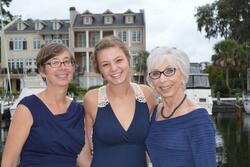Organizing Jewishly in North Carolina
What does organizing Jewishly in the South look like in today’s current political climate? Since joining Carolina Jews for Justice as a community organizer, I have found that there isn’t just one answer.
The first Carolina Jews for Justice event I ever attended was, naturally, a potluck. The promise of food got me into my vehicle and onto the highway, off to meet people I knew only tangentially. As it was April, and nearing graduation, I was uncertain about getting involved in a new group with the promise of moving from my college town on the horizon. I drove from Chapel Hill to Durham: a ten or twelve mile stretch of separation dotted with beautiful trees and the heat of a nationally-known basketball rivalry. At the JCC, just down the road from Duke University, I spent a moment alone in my parked car, talking myself into actually meeting new people. Eventually, my sense of obligation took over (I’d already driven all that way!), and I trundled up to the front of the building. I tugged on the handle and found it was locked. I tried again, and peered through the glass at the receptionist. He motioned for me to wait, before I heard the click of the internal lock releasing. Oh, I thought to myself, that’s right. Jewish centers need security.
I put the jolt of sadness and anxiety I felt out of my mind when I saw the spread of food laid out, flanked by warm, generous people. We shared vegetarian dishes and sat cross-legged on the floor, listening to a guest speaker discuss voting rights in North Carolina. The whole event was informal, and yet incredibly serious. Ten of us sat, completely absorbed, as we learned how to discuss restrictive ID laws with our legislators. The sound of the speaker’s voice was punctuated by the scratches of pencils against paper. After it was all over, we gathered for a photo, and I found myself sandwiched in the middle of the group, beaming. It was the most invigorated I had felt since the 2016 election, surrounded by people who wanted to spend their weekends becoming better organizers. When a job with CJJ opened a few months later, I jumped at the chance to work again with a community that wanted to make lasting change.
CJJ was founded in 2013 after an informal collection of Jewish North Carolinians, known to each other through activism both in and outside of their religious communities, saw that our state lacked a specifically Jewish presence in policy-making. Four main principles govern the group: B’tzelem Elohim (all humans are made the image of G-d, and thus deserve equal respect and attention); V’ahavta l’reacha kamocha (Love your neighbor as yourself); tikkun olam (healing and repairing the world); and Kehillah (community). Built on these tenets, CJJ has established itself as a non-partisan voice on issues ranging from voter suppression to environmental degradation. We are affiliated with several national Jewish organizations, such as Bend the Arc and the Jewish Social Justice Roundtable. At present, we are the only Jewish organization dedicated to policy and justice in North Carolina that serves the entirety of the state.
When I started college, I didn’t expect to get involved with Jewish organizing. I was Jewish because other people saw me as such—despite my mixed-religious parentage and upbringing, I was always the odd kid out. Never quite Jewish enough to become a bat mitzvah, but enough to be the subject of slurs, wielded by children who had never met Jewish people before. I grew up and attended university in North Carolina, my parents having moved in the ‘90s from the established communities of people like us in northern New Jersey. Up there, kids figuring out where they fit into the larger cultural narrative and greater Diaspora are a dime a dozen. In a town shadowed by Confederate monuments and billboards declaring Christ to be our Savior, my family and I celebrated holidays in a pantomime, lighting our menorah but never putting it in a window where others could see.
North Carolina is neither the “deep South” nor free from the trappings of our deeply unjust history—we are caught somewhere in between. Our state legislature has become a national embarrassment; our refusal to reconcile the deeply entrenched racism and classism is a tinderbox constantly ready to implode. Yet it does the state a great disservice to paint with a broad brush: for every injustice leveled against minority communities (historic and ongoing), every attempt to break apart unions, and each cut to our education budget, there are North Carolinians ready and willing to fight.
In my first Jewish studies course at UNC-Chapel Hill, I learned that a formal Jewish community was established in my hometown as early at 1898. I read about Jewish labor activists who worked in Raleigh and Greensboro to push back against unsafe working condition and unfair laws. Just in the last few decades, North Carolina’s rabbis and their congregants have publically spoken out on issues as wide-ranging as gerrymandering and HB2 (the so-called “bathroom bill,” an attempt to undermine trans rights). I began to see beyond my narrow idea of where Jewish radicalism and political community existed within the United States. We may not be in New York, where Jewish organizations are far more established, but we are growing every single day. The creation of CJJ as a group offered a chance to unite uniformly. It is with this context that the wider picture of North Carolina’s history of Jewish organization becomes more readily visible.
So, what does it mean to organize Jewishly in the South in 2018? It’s not a question easily answered. I suppose if I had to sum it up in one word, I would say, persistence. This is true of all organizations—but when you are trying to bring cohesion to a widely scattered group, a dash of patience and a belief that things will work themselves out is essential. There are parts of my job now that still feel impossible. I am still not used to hosting meetings and events where money has to be allotted for security measures. I am still hesitant to respond to strangers when they ask what type of work I do. At best, they are delighted to know “we even exist!” At worst, their voice trails off, and the enthusiasm evaporates from the room. We are not an enormous group, yet. Our meetings are often intimate, with the finer details of how we will make the most impact going forward still up for debate. Still, as we enter 2018, I am endlessly proud of my team for continuing to build power. CJJ is making a new name for Jewish activism in the South. After all, this is our home we’re fighting for.







